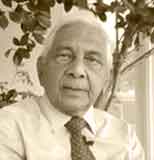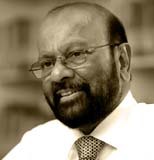- Gamini Wickramasinghe, Dr.Read More...
Dr. Gamini Wickramasinghe, a pioneer in the software industry and private education in Sri Lanka, is the Founder and Chairman of the Informatics Group.
His University education was in England and Belgium. He returned to Sri Lanka in 1983 and established Informatics as a computer company. Informatics was a total turnkey solution company, which offered hardware, software, training and maintenance – i.e. the full range of requirements were offered.
With the realization that there was then a dearth of IT conversant human resources in Sri Lanka because the Universities were not producing a sufficient number of IT graduates to meet Sri Lanka’s demand, Informatics, in 1990, tied up with Manchester Metropolitan University to offer degrees in IT, Information Systems and Computer Science. Informatics was the first institute offering British degrees in Sri Lanka. Thus, Dr. Gamini Wickramasinghe pioneered the concept of offering British tertiary education in Sri Lanka.
Dr. Wickramasinghe states that IIT alumni are encouraged to start entrepreneurial businesses and to set up their own operations. He says that tertiary education institutions should develop individuals in areas for which they are most suited and where there are opportunities available internationally. Sri Lanka could then benefit enormously by producing human resources as “international products”, through foreign exchange earnings and other economic benefits. Dr. Wickramasinghe is of the view that it would be expedient for Sri Lanka to cultivate specific niche areas.
Dr. Gamini Wickramasinghe was acknowledged as a pioneer in the ICT industry and was awarded a token of appreciation at INFOTEL 2014, from FITIS (Federation of Information Technology Industry of Sri Lanka) for the service he has rendered over the years to the ICT industry in Sri Lanka.
- Lalith Gamage, Prof.
Read More...
Prof. Lalith Gamage is the President and CEO of the Sri Lanka Institute of Information Technology (SLIIT). He entered the Department of Electronics and Telecommunication Engineering, at the University of Moratuwa, as an undergraduate. Prof. Lalith Gamage states that this changed his life. After graduation, Lalith Gamage joined the newly established Department of Computer Science and Engineering at the University of Moratuwa as an Engineering as an Instructor. Lalith Gamage has been awarded a Master’s Degree in IT, from the University of Leicester, and a PhD in Mechatronic Engineering from the University of British Colombia.
After being awarded his PhD he returned to the University of Moratuwa where he was a Senior Lecturer. He was keen on promoting the ICT sector. The University appointed him the Director of the Computing Center which gave him the opportunity of working with Government organizations such as the Export Development Board (EDB), Board of Investment (BOI) and private sector IT Companies.
Prof. Gamage has contributed immensely towards promoting the IT industry and has also served the government of Sri Lanka in various capacities. He has served as the Chairman of Arthur C. Clarke Institute for Modern Technologies (ACCIMT), and has been on the Board of the Sri Lanka Computer Emergency Readiness Team | Coordination Center (SLCERT|CC). Prof. Lalith Gamage was instrumental in setting up the “TradeNetSL”, the trade information network of the Export Development Board. Local companies also had the opportunity to transact through the e-Commerce platform, “CyberTrader” which they launched and is the first e-Commerce platform in the country.
Professor Lalith Gamage played a key role in developing the ICT strategy under the ICT Cluster of the USAID sponsored competitiveness initiative, which led towards the development of the e-Sri Lanka Development Program and setting up of the Information and Communication Technology Agency (ICTA) of Sri Lanka.
One of his key achievements is setting up of the Sri Lanka Institute of Information Technology (SLIIT) in 1999; Prof. Lalith Gamage realized that there was a dearth of IT Professionals of good quality in the country and the number of IT graduates being produced by State Universities was not sufficient to meet the needs of the growing IT industry. This led to the setting up of the purpose-built Malabe campus which has been producing over 1000 IT graduates each year during the past years. SLIIT, which had initially offered only IT based programs, later commenced offering degree programs on computer systems and networking, programs on information systems, cyber security programs and software engineering degree programs. SLIIT also commenced offering Master’s degree programs and continues to grow with the industry.
Professor Gamage states that graduates, and not specifically ICT graduates but any graduate should not merely concentrate on passing exams. They should be able to apply the knowledge acquired in solving real-world problems; understand and analyze the nature of these problems, be able to work with teams. These attributes would result in a good professional.
- Niel Gunadasa, Mr.
Read More...Mr. Niel Gunadasa has been awarded a B.Sc. degree from the University of Kelaniya, a Postgraduate Diploma in Education Management from the Postgraduate Institute of Management, University of Sri Jayewardenepura, a Postgraduate Diploma in Education from the University of Colombo, a Postgraduate Diploma in Education Management from the National Institute of Education (NIE), Maharagama and a M.Sc. on Information Management from the University of Sheffield, UK.
Mr. Niel Gunadasa is at present the Director of Education, (SLEAS-I) of the Data Management Branch, of the Ministry of Education, Sri Lanka. One of his key responsibilities is implementing the National Education Management Information System (NEMIS), which addresses the preparation of data and information on the education system. Mr. Gunadasa was the Director of Education at the ICT Branch of the Ministry of Education from 2006 to 2016, where he was responsible for the implementation of many key projects which impacted the entire country and made a positive change in the ICT education arena.
- Sam Karunaratne, Prof.
Read More... Professor Sam Karunaratne recollects a period more than half a century ago – i.e., the 1960s – when computerization commenced in Sri Lanka, then known as Ceylon. He recalls that the Government in the late 1960s decided to allocate a computer to a State sector organization. Dr. A.N.S. Kulasinghe, a civil engineer and the Founder Chairman of the State Engineering Corporation (SEC) indicated that he was in dire need of a computer. Consequently, SEC was allocated slightly over LKR 2 million to purchase a computer. Prof. Sam Karunaratne who was then at the University of California, Berkely, USA, returned to Sri Lanka in April 1967, and joined SEC. SEC initially tried to purchase an IBM System/360 computer, but they then realized that this computer was not yet sold in Sri Lanka. Therefore, SEC purchased an ICL 1900 series mainframe computer which had facilities for carrying out scientific and engineering work. This was the first computer in Sri Lanka. The computer was ordered but there was a lapse of several months before delivery. SEC then recruited computer personnel; systems analysts, programmers, computer operators and data entry operators. The four systems analysts were Dr. R.B. Ekanayake, Mr. Ranjan Perera, Mr. S.J. Silva and another.top
Professor Sam Karunaratne recollects a period more than half a century ago – i.e., the 1960s – when computerization commenced in Sri Lanka, then known as Ceylon. He recalls that the Government in the late 1960s decided to allocate a computer to a State sector organization. Dr. A.N.S. Kulasinghe, a civil engineer and the Founder Chairman of the State Engineering Corporation (SEC) indicated that he was in dire need of a computer. Consequently, SEC was allocated slightly over LKR 2 million to purchase a computer. Prof. Sam Karunaratne who was then at the University of California, Berkely, USA, returned to Sri Lanka in April 1967, and joined SEC. SEC initially tried to purchase an IBM System/360 computer, but they then realized that this computer was not yet sold in Sri Lanka. Therefore, SEC purchased an ICL 1900 series mainframe computer which had facilities for carrying out scientific and engineering work. This was the first computer in Sri Lanka. The computer was ordered but there was a lapse of several months before delivery. SEC then recruited computer personnel; systems analysts, programmers, computer operators and data entry operators. The four systems analysts were Dr. R.B. Ekanayake, Mr. Ranjan Perera, Mr. S.J. Silva and another.top - Lalith Gamage, Prof.


